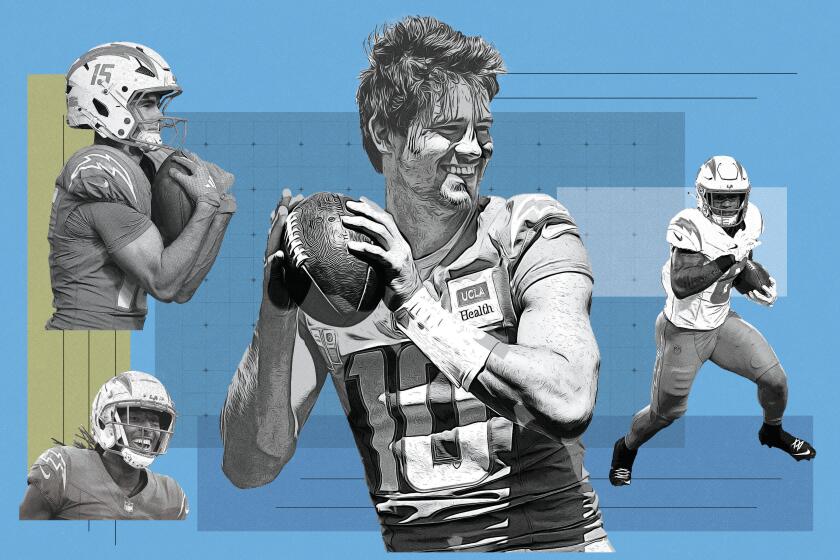In his second season as San Francisco’s coach, Jim Harbaugh got the 49ers to the Super Bowl. While that’s a big ask of the Chargers, especially for a club that hasn’t won a postseason game since 2018, it’s reasonable to predict his team will do as well or better than last year’s 11-6 finish.
Chargers quarterback Justin Herbert passes during a preseason game against the Rams at SoFi Stadium on Aug. 16. (Allen J. Schaben / Los Angeles Times)
A big question: Is Justin Herbert an elite quarterback? His coach certainly thinks so. “I woke up the other day and said, ‘Gotta get Justin Herbert to the Hall of Fame. … That would mean winning a couple Super Bowls,’” Harbaugh said on “The Rich Eisen Show” this offseason. “A lot of people would benefit from that. That’s a worthy goal.”
Advertisement
It’s a lofty ambition, especially considering Herbert has yet to win a playoff game. The 6-foot-6 passer, entering his sixth NFL season, has another chance to translate his talent into postseason results. He threw only three interceptions during the regular season, but tossed four in the playoff loss to Houston, including his first pick-six in 46 games.
The challenge just got tougher. Ten days after signing left tackle Rashawn Slater to a historic deal for offensive linemen, the Chargers lost him for the season to a knee injury. That leaves Herbert’s blind side in the hands of rookie Joe Alt.
It’s a crowded AFC quarterback field with Patrick Mahomes, Josh Allen, Lamar Jackson and Joe Burrow. The question is whether Herbert can finally join that top tier.

Chargers offensive tackle Joe Alt will start at left guard following Rashawn Slater’s season-ending knee injury in training camp. (Robert Gauthier / Los Angeles Times)
Losing Slater is a devastating blow, but the timing allowed the Chargers to reshuffle. Alt, a standout left tackle at Notre Dame, shifted over from the right side.
Advertisement
“He’s one of our top guys, elite player on the team,” Harbaugh said. “Great player. He’s been ascending as much as anybody on the team. People ask me, ‘Who’s the most improved guy?’ It could be Joe Alt, and he was really good last year.”
The original vision was Slater at left tackle and Alt at right, a pair of brick-wall bookends, for years to come. Now, with Alt sliding left, Trey Pipkins moves into his more natural spot at right tackle. The group is as prepared as it could be, but as Harbaugh admitted, losing Slater was a “gut punch.”
The bigger issue last season, particularly evident in the playoff loss at Houston, was vulnerability inside. To address that, the team added right guard Mekhi Becton and will stick with Bradley Bozeman at center and Zion Johnson at left guard.

Chargers rookie running back Omarion Hampton could spearhead the team’s running game this season. (Luke Johnson / Los Angeles Times)
For the first time since 2015, the Chargers used a first-round pick on a running back, selecting North Carolina’s Omarion Hampton. Harbaugh and offensive coordinator Greg Roman plan to lean heavily on a physical ground game.
Advertisement
“He’s the total package,” Roman said at camp. “His vision, I’m really pleased with what I’m seeing right now. You don’t see a lot of guys find the hole like he’s doing right now, which is exciting.”
Roman envisions bringing Hampton along much the way he did J.K. Dobbins in Baltimore, when the rookie averaged 5.8 yards per carry and scored 10 touchdowns in 2020.
The Chargers won’t rely on Hampton alone. Veteran Najee Harris missed all of training camp with an eye injury suffered in a July 4 fireworks accident, but returned to practice last week. Fullback/defensive lineman Scott Matlock, listed at 296 pounds, adds unique versatility as a backfield blocker or extra lineman in jumbo sets.
According to the “Chargers Weekly Podcast,” the team ran 143 plays last season with at least seven players weighing 285 pounds or more. That led the league by a mile; Baltimore ranked second with just 28.
Advertisement
With the quarterback of Herbert’s caliber, the Chargers want to open the passing lanes.
There’s plenty of buzz around rookie wideouts Tre’ Harris (second round) and KeAndre Lambert-Smith (fifth round), though history shows first-year receivers rarely make an immediate splash. Then again, it wasn’t long ago that Ladd McConkey broke that mold.

Chargers wide receiver Ladd McConkey is poised to see plenty of targets after a phenomenal rookie campaign. (Robert Gauthier / Los Angeles Times)
A 2024 second-round pick out of Georgia, McConkey delivered a tremendous rookie campaign, setting franchise marks with 82 receptions and 1,149 yards. He is now entrenched as WR1.
“We were able to do things with Ladd in Year 1 that you generally don’t do with a guy until Year 3 or 4,” Roman said on the “Chargers Weekly Podcast.”
Advertisement
“His football IQ, a lot of different things that give him options to get open … graduate-level stuff, as I like to call it.”
Who emerges as his sidekick remains to be seen, Quentin Johnston, Harris, or Lambert-Smith. Then there’s Keenan Allen, who returns after a season in Chicago. Now 33, Allen still thrives in the slot, where McConkey also operates. He may have lost a step, but his game was never built on speed. Just two years ago, he posted 1,243 yards, the second-best season of his career.
The AFC West boasts star tight ends in Travis Kelce (Chiefs), Brock Bowers (Raiders) and Evan Engram (Broncos). The Chargers take a committee approach, adding veteran Tyler Conklin, a reliable pass-catcher with the Jets and Vikings, and drafting Oronde Gadsden II, the most productive tight end in Syracuse history.
Will Dissly, who arrived last season after six years in Seattle, is expected to return to his more natural blocking role after being pressed into receiving duty.
This story originally appeared in Los Angeles Times.
